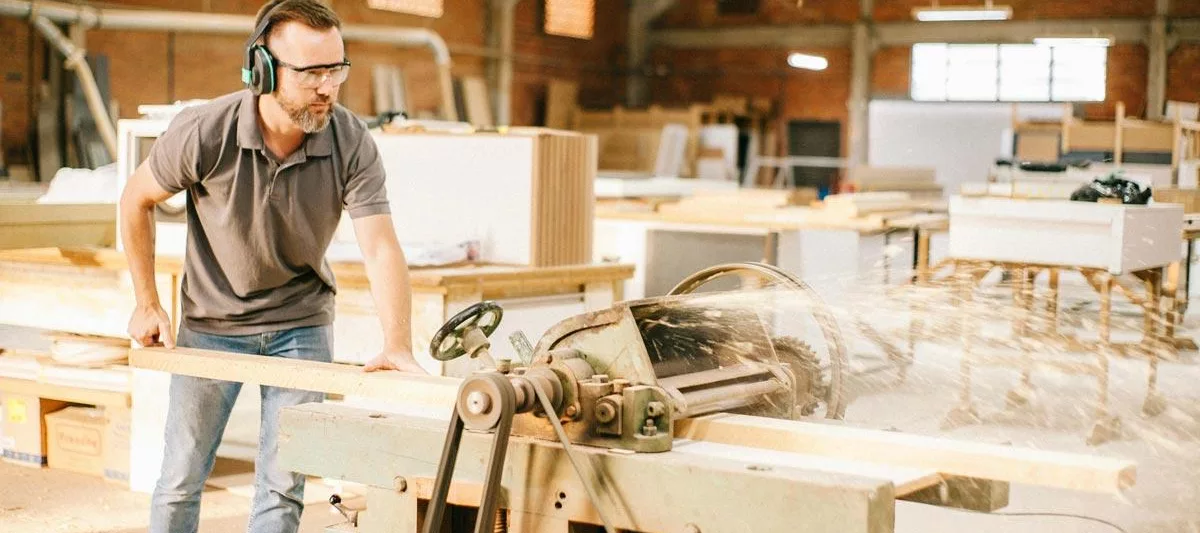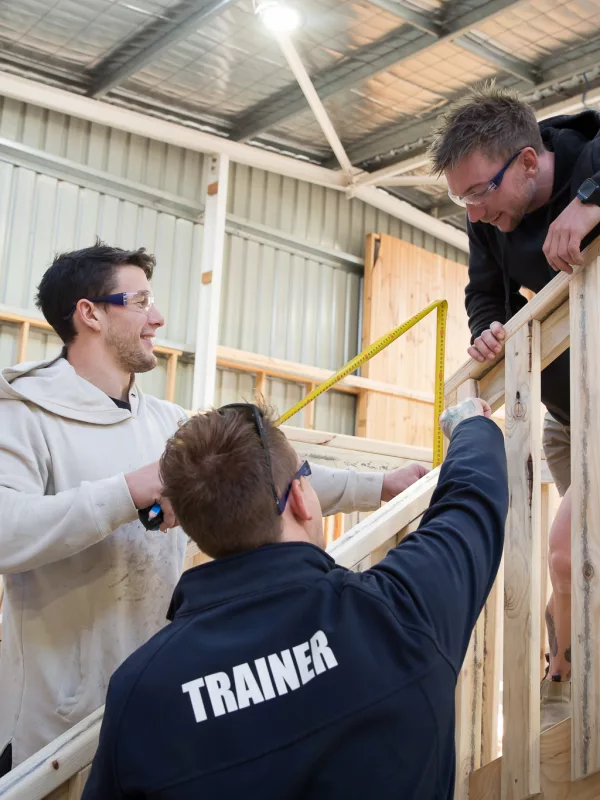Build Your Future with a Carpentry Apprenticeship in Adelaide

If you enjoy hands-on work, love working outdoors, and have an eye for design and detail, a carpentry apprenticeship could be the perfect start for you. Carpenters are essential to the construction and renovation industries — from framing homes and installing cabinetry to crafting custom structures and fittings. With the right training and support, you can build a rewarding, in-demand career that combines practical skills with creativity and variety.
ATEC Group Training supports aspiring carpenters in launching their careers through practical, real-world training provided by our carpentry apprenticeship pathways. Whether you’re a school leaver or changing careers, we’re here to guide you from your first placement to your final qualification.
What is a Carpentry Apprenticeship?
A carpentry apprenticeship is a nationally recognised training pathway that combines paid, hands-on work experience with structured off-the-job learning. Usually completed over four years, it leads to a CPC30220 Certificate III in Carpentry, which qualifies you to become a skilled tradesperson capable of working in domestic, commercial, and industrial construction settings.
As a carpentry apprentice, you'll learn to:
- Read and interpret building plans and specifications
- Measure, cut, shape, and assemble timber and other materials
- Install walls, floors, roofs, windows, doors, and fixtures
- Use hand and power tools safely and effectively
- Work on construction sites in line with WHS regulations
- Communicate and collaborate with builders, clients, and other trades
Your training will combine theory with on-site practice, preparing you to work on a wide range of projects — from residential housing and renovations to commercial fit-outs and formwork.
Why choose a Group Training Organisation like ATEC?
Taking on your carpentry apprenticeship through a Group Training Organisation (GTO) like ATEC provides many benefits over going it alone. We employ you directly and place you with suitable host employers in the industry, ensuring you gain practical experience across a variety of carpentry environments — all while receiving dedicated support.
Secure Employment
You’re employed by ATEC, not the host employer. This means you have a consistent wage, superannuation, insurance, and access to support, even if one placement ends. We’ll find a new one for you, ensuring your apprenticeship stays on track.
Diverse Work Experience
We partner with host employers across South Australia, placing you in residential, commercial, and industrial construction settings. This gives you broad, real-world experience that enhances your skill set and future job prospects.
Ongoing Mentorship
You won’t be left to navigate the trade alone. Our team provides continuous support and mentoring, both at work and during your formal training. If you need help or your circumstances change, we’re here to assist.

What you’ll need to get started with a Carpentry Apprenticeship
Carpentry suits people who enjoy physical work, like solving practical problems, and have an eye for detail. To begin your apprenticeship, it helps to have:
- A genuine interest in building and construction
- Good hand-eye coordination and physical stamina
- Basic maths skills (for measurements and calculations)
- A driver’s licence (or working towards one)
- A White Card (construction induction card)
Experience isn’t essential, but a can-do attitude, willingness to learn, and reliability go a long way. Whether you’re 17 or 37, there’s a place for you in the trade.
Essential skills and qualities for Carpentry Apprentices
To succeed in a carpentry apprenticeship — and the trade long-term — you’ll need to develop a mix of technical skills and soft skills.
Technical Skills
These are the hands-on, job-specific abilities you'll build over time:
- Tool Handling: Knowing how to safely and correctly use tools like saws, drills, chisels, nail guns, and measuring devices
- Construction Techniques: Understanding framing, formwork, roofing, decking, cladding, and finishing techniques
- Blueprint Reading: Interpreting plans, layouts, and specifications
- Site Safety Knowledge: Following WHS procedures to maintain a safe working environment
Soft Skills
These are just as important in building a long-term career:
- Communication: Working with supervisors, clients, and other tradespeople
- Problem-Solving: Adjusting plans or methods when things don’t go to plan
- Attention to Detail: Making sure cuts, joins, and finishes are accurate
- Time Management: Sticking to project timelines and showing up consistently
- Teamwork: Collaborating on worksites and contributing to positive crew dynamics
How to Develop These Skills During Your Apprenticeship
To help you get the most from your carpentry apprenticeship, ATEC recommends the following:
- Ask Questions: A great way to learn is to stay curious and ask your supervisor or mentor for feedback.
- Practice Regularly: The more hands-on experience you gain, the faster you’ll improve.
- Take Ownership: Show initiative, take on responsibility where appropriate, and be open to tackling new challenges.
- Use Your Off-the-Job Training Wisely: Engage fully in your formal training and apply what you learn on-site.
- Learn From Mistakes: Mistakes are part of the learning process. Use them to build your skills and confidence.
Earn while you learn
One of the biggest benefits of a carpentry apprenticeship is getting paid while you train. Your pay increases as you progress through your apprenticeship, and once qualified, carpenters in South Australia can earn strong wages, with opportunities to move into supervision, project management, or even running your own business.

Strong demand for Carpenters in Adelaide and South Australia
Australia’s construction boom is fuelling a steady and robust demand for carpenters, with job opportunities available across both urban and regional areas. As of August 2023, there were over 9,000 carpenter job vacancies nationwide (Lismore App, 2024). The construction sector contributes about 9% to Australia’s GDP, underpinning significant employment opportunities for skilled tradespeople like carpenters (Lismore App, 2024).
South Australia’s construction sector is thriving, with ongoing demand for qualified carpenters in housing, commercial builds, and government infrastructure projects. At the time of writing, there are approximately 6,600 carpentry and joinery tradespersons employed in South Australia.
Once qualified, carpenters can work in residential construction, commercial building, shopfitting, renovation, or even heritage restoration. The versatility of the trade means that your skills are always in demand and transferable anywhere in Australia. With new developments, renovations, and green construction on the rise, now is a great time to start your career in carpentry.
Why ATEC for your Carpentry Apprenticeship?
ATEC Group Training is one of South Australia’s most trusted names in trade apprenticeships. We don’t just sign you up — we support you throughout your entire journey, from finding the right host employers to helping you qualify with confidence.
With ATEC, you’ll benefit from:
- Paid placements with reputable host employers
- Full employment and administrative support
- Industry mentoring and personalised guidance
- Help enrolling with ATEC Registered Training Organisation (RTO) or third-party RTO
- Security, continuity, and career development support
Do you have a question about any of the information here?
 Make an Enquiry
Make an Enquiry


